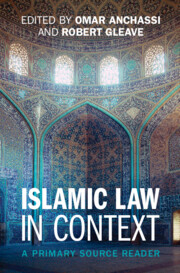Book contents
- Islamic Law in Context
- Islamic Law in Context
- Copyright page
- Contents
- Acknowledgements
- Contributors
- Introduction
- Part I Islamic Legal Theory (Uṣūl al-Fiqh) and Related Genres
- Part II Islamic Jurisprudence (Fiqh) and Related Genres
- Part III Legal Opinions (Fatwās)
- Part IV Court Judgments and Other Court Documentation
- Part V Judicial Manuals and Reference Books
- Part VI Alternative Sources for Islamic Legal Studies
- Name Index
- Subject Index
- References
Part III - Legal Opinions (Fatwās)
Published online by Cambridge University Press: 14 November 2024
- Islamic Law in Context
- Islamic Law in Context
- Copyright page
- Contents
- Acknowledgements
- Contributors
- Introduction
- Part I Islamic Legal Theory (Uṣūl al-Fiqh) and Related Genres
- Part II Islamic Jurisprudence (Fiqh) and Related Genres
- Part III Legal Opinions (Fatwās)
- Part IV Court Judgments and Other Court Documentation
- Part V Judicial Manuals and Reference Books
- Part VI Alternative Sources for Islamic Legal Studies
- Name Index
- Subject Index
- References
Summary

- Type
- Chapter
- Information
- Islamic Law in ContextA Primary Source Reader, pp. 189 - 260Publisher: Cambridge University PressPrint publication year: 2024

